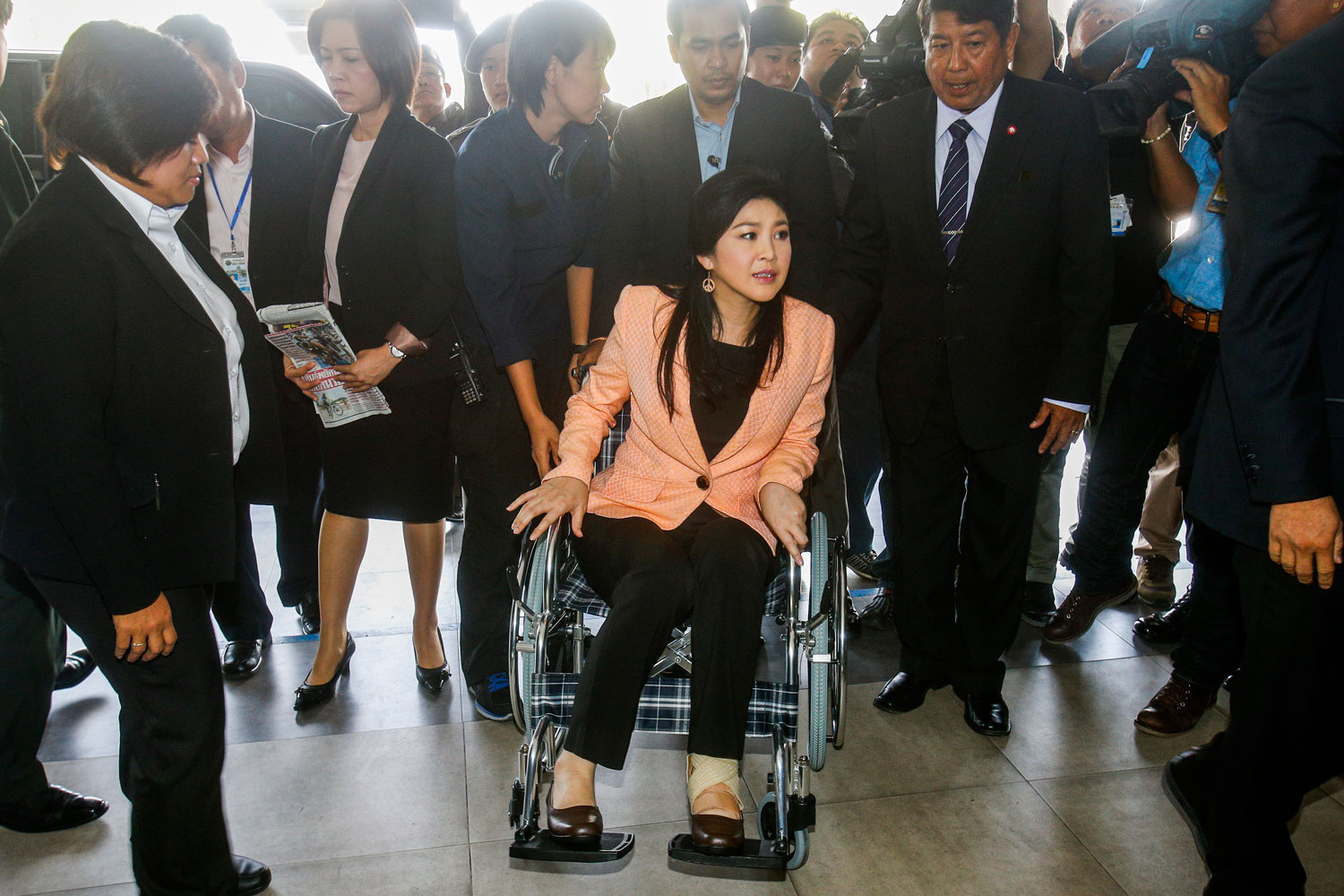
The barricades have gone, so have the rallies, and grenades aren’t being thrown into crowds of protestors for the time being, but the nightmare is not quite over for Yingluck Shinawatra.
On Wednesday, Thailand’s embattled prime minister lifted the state of emergency that since Jan. 22 had governed large swaths of Bangkok, the world’s most visited city, and nearby provinces, in the face of huge anti-government protests.
“The cabinet lifted the state of emergency to instill more confidence in the private sector and tourist industry,” Yingluck told reporters.
The prolonged political conflict in the “Land of Smiles” has already cost the economy more than $3 billion, and another six months of similar strife could result in a recession for 2014. Tourism arrivals were down 4.1% in January and February compared to the same vital high-season period last year.
“The protests have been so destructive,” says Paul Chambers, research director of political science at Chiang Mai University. “They have served to create economic and political turmoil and haven’t been useful to the country at all.”
At least 23 people died and hundreds were injured in more than three months of street demonstrations. Protests that began with a carnival atmosphere soon descended into bedlam as shootings, explosions and brawling took place amid the temples and shopping malls of the sprawling Thai capital.
Thailand’s first female leader is accused of being a puppet of her notorious brother, exiled former Prime Minister Thaksin Shinawatra, who was ousted in a military coup in 2006 but still wields considerable power from his Dubai bolt hole.
The initial unrest was sparked in November by the introduction of an Amnesty Bill that would have allowed Thaksin, convicted of corruption in absentia, to come home a free man. A huge bipartisan public outcry saw this legislation shelved at the Senate, but the protests soon morphed into a general indictment of the Yingluck administration from Bangkok-based middle classes and voters in southern provinces.
Yingluck called snap elections to reassert her mandate, but the main opposition Democrat Party — mindful that Thaksin-backed parties had won every election since 2001 and retain fervent support in the populous north and northeast — boycotted the polls, instead demanding that a unelected “people’s council” enact unspecified reforms before democracy could resume.
But the hordes of anti-government protesters, once numbering in the tens of thousands, that paralyzed key intersections of Bangkok in pursuit of that quixotic goal have dwindled considerably, and now boast just a symbolic vestige within Lumpini Park.
The fizzling out of the protests undoubtedly chaffs Suthep Thaugsuban, the impish leader of the People’s Democratic Reform Committee, or PDRC, who spearheaded the protest movement. The 64-year-old repeatedly vowed to accept nothing less than Yingluck’s resignation and steadfastly refused to negotiate.
“I am so proud to lead this movement, I’m proud of all of the PDRC for standing up for what is right and true, and I’m exceptionally proud of the Thai people who are embracing ownership of democracy and better government,” he told TIME at the height of the protests.
Despite this bravado, his once impenetrable carapace appears to be weakening. The former deputy prime minister has an arrest warrant on charges of rebellion outstanding, and he would appear to have precious little defense after openly storming government buildings and imploring his cohorts to harangue civil servants.
Yet it is possible Suthep may still engineer the last laugh. Yingluck leads essentially a caretaker government and key development projects have been hamstrung. Public dissatisfaction with sluggish progress in domestic politics cruelly dovetails with myriad judicial quagmires for her.
On Feb. 27, Yingluck was indicted for alleged malfeasance regarding a rice-pledging scheme that drained the national purse to the tune of some $20 billion since 2011. If found guilty, she could be removed from office and face a five-year ban from politics. A decision could come as early as Friday.
“Suthep’s importance has past and now the judiciary is guiding the royalists to eject Yingluck and Pheu Thai from office,” says Chambers. (The courts, military and royal court are generally perceived as elitist institutions that favor the establishment and so, by extension, the protesters.)
In addition, 308 Thai MPs, mainly members of Yingluck’s Pheu Thai party, have been indicted for attempting to alter the composition of the Senate, a move initiated after the Amnesty Bill was thrown out in November.
The Constitutional Court also ruled in January that a proposed amendment to article 190, which would have allowed the PM to sign foreign economic deals without legislative approval, was unconstitutional. The National Anti-Corruption Commission (NAAC) has been asked to investigate, and may similarly indict every lawmaker who voted in favor of the amendment.
What’s more, the elections held on Feb. 2 may soon be annulled by the Constitutional Court, since Protesters besieged polling stations meant that a quorum of 95% of seats filled was not met.
“The players in this conflict do not seem to care about the rule of law,” says Chambers. “Thailand has been so divided since 2005 that each side seems to care more about venal interests than the welfare of the country.”
Yingluck’s position is certainly precarious, but she has weathered similar storms in the past. The 46-year-old is currently restricted to a wheelchair after injuring her left ankle. “Even though I have a torn ligament, I will continue doing my work,” she told reporters. Certainly, nobody should doubt her tenacity by now.
—with reporting by David Stout
More Must-Reads From TIME
- The 100 Most Influential People of 2024
- The Revolution of Yulia Navalnaya
- 6 Compliments That Land Every Time
- What's the Deal With the Bitcoin Halving?
- If You're Dating Right Now , You're Brave: Column
- The AI That Could Heal a Divided Internet
- Fallout Is a Brilliant Model for the Future of Video Game Adaptations
- Want Weekly Recs on What to Watch, Read, and More? Sign Up for Worth Your Time
Write to Charlie Campbell at charlie.campbell@time.com